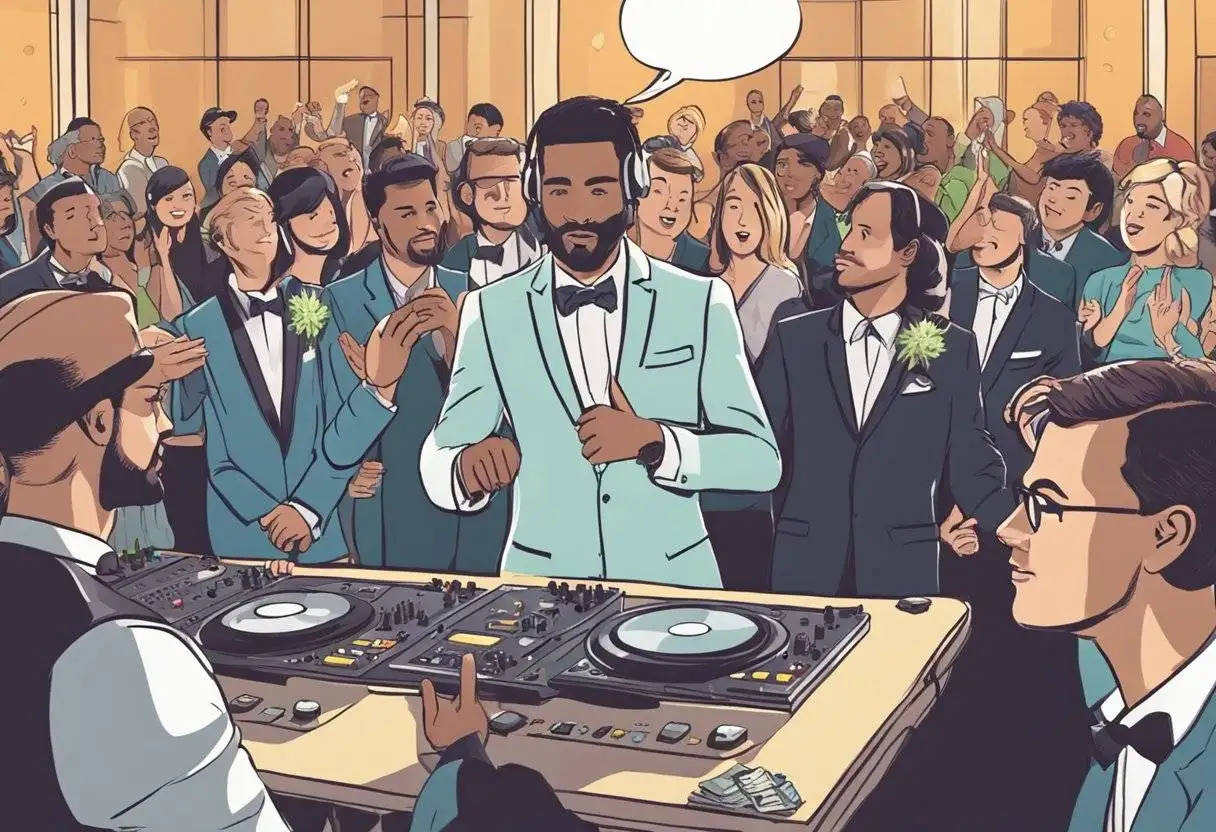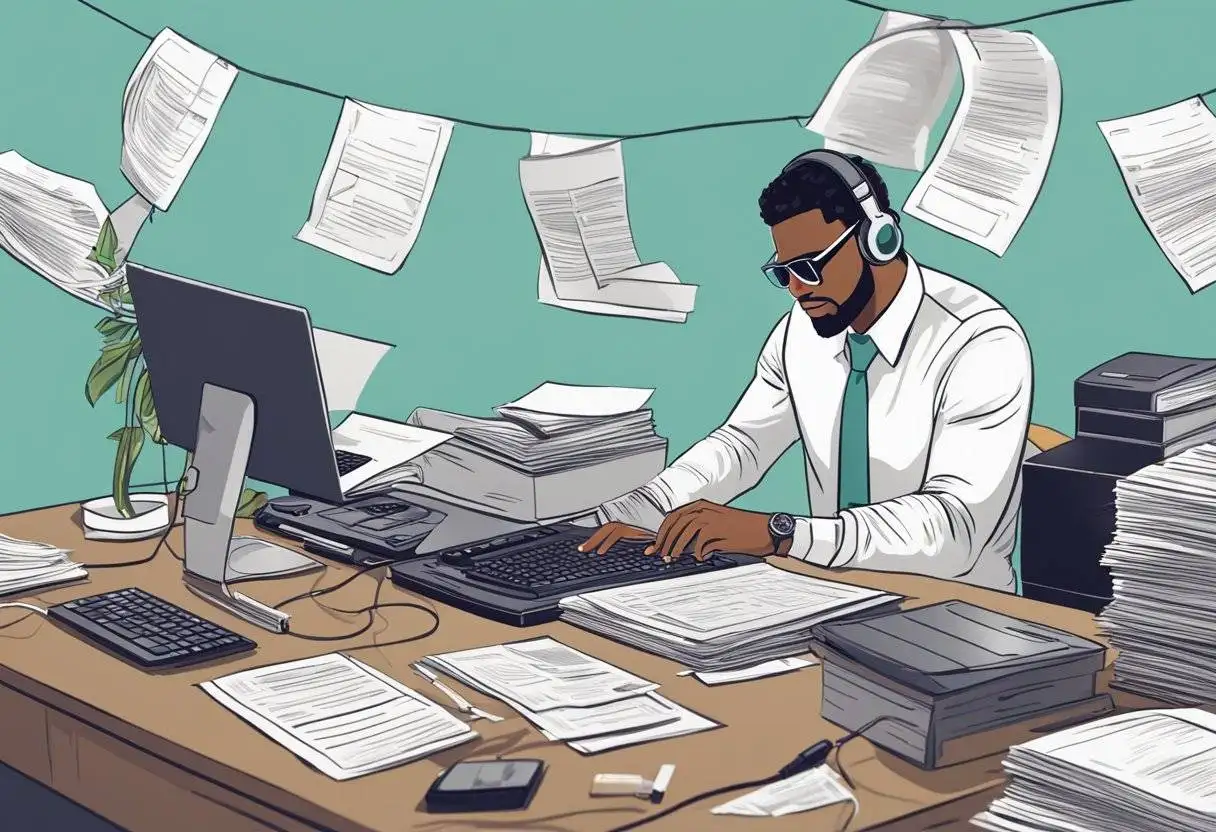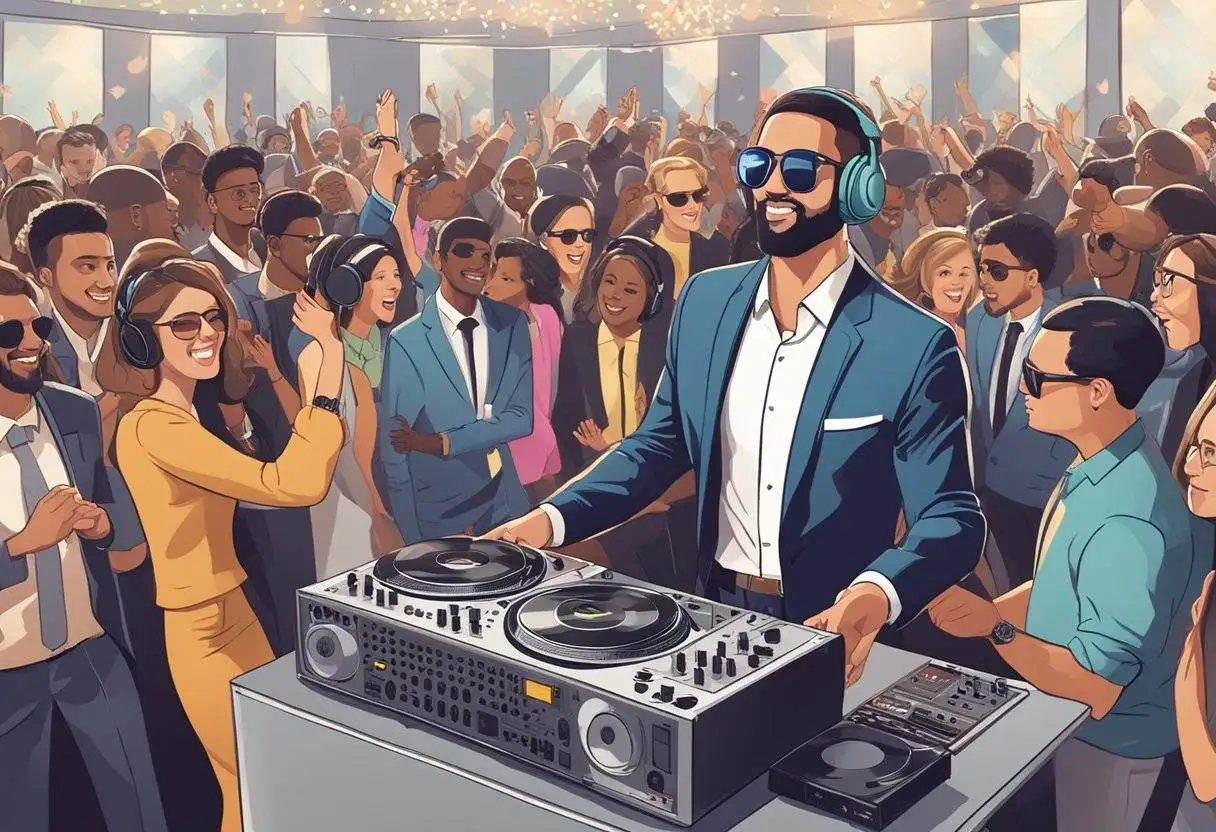When planning a wedding, music is one of the pivotal elements that sets the mood and energizes the celebration. Wedding DJs are tasked with curating a soundtrack that not only entertains guests but also resonates with the couple’s taste. However, an often overlooked aspect of a DJ’s job is navigating the complexities of music copyrights and royalties. I understand that legally using music involves more than just purchasing a track. The moment the first dance song echoes through a wedding hall, a public performance is taking place, and this has legal ramifications concerning copyright law.

Being a wedding DJ isn’t simply about mixing beats and reading the room, it’s also about compliance with legal requirements. In the US, copyrighted music is protected, and whenever it is played publicly, royalties are potentially due. When I perform, I ensure that the music licenses are in order, typically through agreements with Performing Rights Organizations (PROs) such as ASCAP, BMI, or SESAC. This allows me to play music at events without infringing on the rights of songwriters and performers. In my career as a DJ, securing the appropriate licenses is a critical step that allows both the celebration and music to flow uninterrupted.
Key Takeaways
- Wedding DJs play a crucial role in both the celebration and compliance with music copyright laws.
- Appropriate licenses from PROs are necessary for DJs to play music publicly.
- Ensuring that music royalties are properly managed is part of professional DJ responsibilities.
Understanding Copyright Law and Royalties
In this section, I will explore the intricacies of copyright law and how it governs the payment of royalties for music, impacting artists, songwriters, and publishers alike.
The Basics of Copyright Law
Copyright is a form of legal protection granted by law to the creators of “original works of authorship,” including literary, dramatic, musical, and certain other intellectual works. This protection is available to both published and unpublished works. As an artist or songwriter, my right to copyright begins automatically from the moment I create a work that is fixed in a tangible form that is perceptible either directly or with the aid of a machine or device.
Key components of copyright law include:
- Exclusive rights: The ability to control who can reproduce my work, prepare derivative works, distribute copies, and perform or display my work publicly.
- Duration: Copyright typically lasts for the life of the author plus an additional 70 years after their death, ensuring long-term protection and benefits to their estate.
How Royalties Work for Music
Royalties are the payments that artists, songwriters, and publishers receive when their copyrighted music is used or performed publicly. As an artist, I earn royalties through several streams each time my music is:
- Sold on mediums like CDs or digital downloads;
- Streamed on platforms such as Spotify or Apple Music;
- Performed live at venues, which might include weddings where DJs play my music.
There are different types of royalties, and each is collected by various organizations:
- Performance royalties: Collected by Performing Rights Organizations (PROs) like ASCAP, BMI, and SESAC when music is played in public.
- Mechanical royalties: Owed when a song is reproduced and distributed physically or digitally.
- Synchronization royalties: Arising from the use of music in sync with visual media such as movies or commercials.
Collectively, these royalties ensure that I, as a creator, am fairly compensated for the ongoing use of my music, reinforcing the sustainability of artistic careers and legal compliance by individuals and organizations that utilize copyrighted works.
Licensing and Permission
When it comes to playing music publicly at events like weddings, I, as a DJ, need to ensure that I’ve navigated the complexities of music licensing and permission. It’s crucial to acquire the correct licenses, understand the fees involved, and recognize the role of Performing Rights Organizations.
Acquiring the Correct Licenses
To play music legally at weddings, I must procure licenses from the appropriate entities. Licensing involves obtaining permission for music usage, where the terms are clearly defined. This generally includes a licensing fee and sometimes a membership fee, dependent on the organization. There are various types of licenses, but for wedding events, the most pertinent is the public performance license.
Permissions and Fees for DJs
As a DJ, it’s my responsibility to ensure that the music I play has the proper permissions. This typically means coordinating with venues to verify they have paid the necessary fees to Performing Rights Organizations (PROs) like ASCAP, BMI, or SESAC. These fees are essential because they compensate the songwriters and artists whose music I am using to provide entertainment.
Role of Performing Rights Organizations
ASCAP, BMI, and SESAC play a pivotal role in the music industry by acting as intermediaries between music creators and those who want to use their music in public. These organizations collect performance royalties and distribute them to their members, which include songwriters and composers. For me, understanding the workings of these PROs is crucial as they establish the guidelines and fees for using copyrighted material in my performances.
Impact for Wedding DJs

In my role as a wedding DJ, it’s imperative to understand the intersection of music and law to ensure compliance with royalty payments. This can have a significant impact on my profession and the services I provide at weddings.
Legal Requirements for Wedding DJs
As a wedding DJ, I am not directly responsible for music royalties associated with a public performance. These fees are typically covered by the venues due to the legal requirement to compensate songwriters and performers for the use of their work. Despite this, it’s crucial for me to be aware of the performing rights organizations (PROs) such as ASCAP, BMI, and SESAC, which manage these royalties.
- Understanding PROs: It’s crucial for me to know which PROs the venue is affiliated with and whether their licenses cover my playlist.
- Setlists and Reporting: I may need to submit my setlists to the venue or directly to the PROs if requested, ensuring all songs played are accounted for.
Venue Responsibilities
The venue, where the wedding takes place, plays a pivotal role in addressing music royalties. As they are the ones hosting the event and I am performing the music in a public space, the onus falls on them.
- Royalty Payments: Venues are expected to have agreements with PROs and pay the necessary licensing fees for any music played on their premises.
- Ensuring Compliance: It’s in the best interest of the venue to maintain up-to-date licenses to avoid legal issues, which in turn protects me as a DJ.
By staying informed of these requirements, I can focus on creating an engaging experience for the wedding crowd while alleviating legal concerns regarding the music played.
Professional Considerations and Compliance

In my career as a DJ, understanding the legal landscape and ensuring compliance is crucial. I’ll discuss how to build a legally compliant DJ business and the importance of insurance and liability.
Building a Legally Compliant DJ Business
First and foremost, I need to obtain the proper licensing for the music I play. This typically involves paying performance royalties through organizations such as ASCAP, BMI, or SESAC, which act as intermediaries between artists and the public who listen to their music. I must ensure that my contracts with venues and clients are transparent about who holds the responsibility for these royalties.
Legal Documentation:
- Performance licenses
- Contracts with clear terms regarding royalty responsibilities
Compliance with copyright law is another non-negotiable aspect. Any copyright infringement can result in hefty fines—a risk no professional DJ can afford. Thus, familiarizing myself with copyright laws and ensuring I only use music for which I have the legal right is part of my routine.
Copyright Compliance:
- Understanding of fair use provisions
- Use of legally sourced music
Insurance and Liability for DJs
Liability insurance is critical for my business. It protects me from potential claims arising from property damage or injuries at events where I perform. Without this insurance, I would be personally responsible for any costs incurred, which could be financially devastating.
Insurance Necessities:
- General liability insurance
- Equipment insurance
Additionally, it’s important that I understand the extent of the coverage provided by my insurance policy. It should cover legal defense costs if I’m ever sued for copyright infringement or if there’s a breach of contract. Being proactively insured means I can focus on delivering great performances without the looming fear of potential litigation.
Coverage Specifics:
- Legal defense
- Breach of contract
- Property and injury claims
By operating within these frameworks, I can maintain a professional reputation and a legally sound business.
Frequently Asked Questions

In this section, I’ll address common queries related to the royalty obligations and legal considerations for DJs performing at weddings.
What licenses are required for DJs to play music publicly?
To play music publicly, DJs typically need to obtain a public performance license, which covers the rights to play music owned by composers, songwriters, and publishers. This is often managed through organizations like ASCAP or BMI in the United States.
How can wedding DJs ensure compliance with copyright laws?
Compliance with copyright laws requires wedding DJs to acquire proper licenses for the music they play. This may include performance licenses or agreements with rights holders. Staying informed on copyright updates is crucial for compliance.
Are there different royalty rules for live bands and DJs at weddings?
Yes, there are different royalty rules for live bands and DJs. Bands often cover songs and may only need a mechanical license, while DJs typically require a performance license because they play original recordings.
What is the role of organizations like ASCAP in music licensing for events?
Organizations like ASCAP collect performance royalties on behalf of songwriters and publishers, then distribute these to their members. They play a pivotal role in the music licensing process for events.
How can DJs legally acquire music for public performance?
DJs can legally acquire music for public performance by purchasing it from legitimate sources, ensuring they have the right to play it. Additionally, they should have the appropriate licenses for public performance.
What steps must be taken to avoid copyright infringement as a DJ?
To avoid copyright infringement, I must secure the necessary performance licenses, refrain from playing unauthorized copies of music, and stay updated on the laws governing music rights to ensure all the music played is done so legally.
